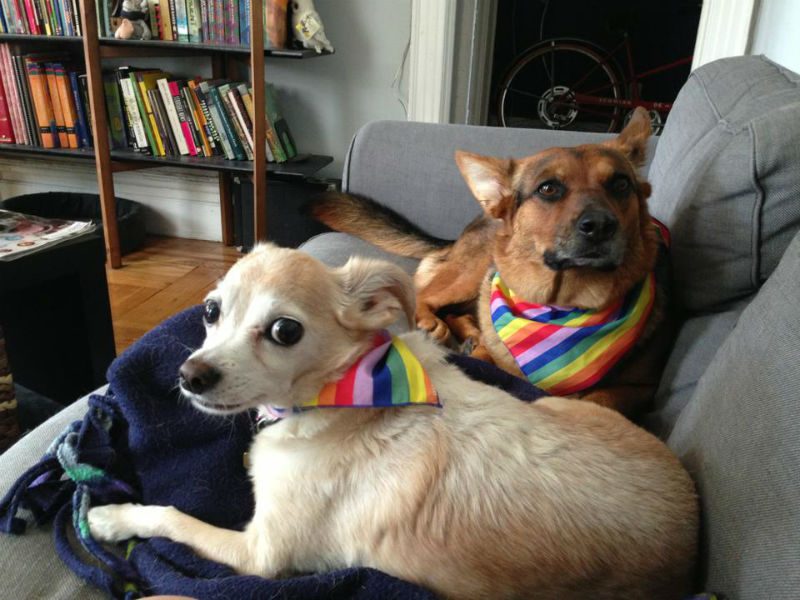The argument against heart dogs – how finding your soul mate in a dog might be problematic.
Are you familiar with the concept of a Heart Dog? It’s a term that gets thrown around a lot in the dog world. Basically it’s the idea that once in a lifetime you meet a dog and share this insanely close connection, like closer than any human and dog have ever been.
It’s like your souls were split in two and became one person and one dog and then you meet and bones and roses fall from the sky, and you live happily ever after-kind of the same idea as a soul mate between people, only with more dog biscuits. Sounds wonderful right? But, what if striving for the idea of heart dogs is actually keeping us from having fulfilling relationships with our dogs…
The concept of the “heart dog” of course isn’t a lesbian specific phenomenon, but given how many of us are dog people, and taking into account the stereotype of lesbians as serial monogamists, well… integrating the idea feels relevant to our community. When I started to think about the idea more, what I found most awkward about heart dogs as a concept, is how it’s a (not so) veiled construct of monogamy.
I don’t ascribe to principals of monogamy for my romantic human relationships, why would I try to construct my relationships with dogs in such a limited way?
In my life so far, I’ve been lucky enough to form close bonds with seven dogs who made a big enough impression that I honored them in tattoos on my body. These are dogs who were my first foray into building queer family; they were my childhood companions growing up in an abusive home.
Dogs introduced me to one of my biggest passions—dog training and canine sports, and they have been my consistent companions and playmates. My relationship to each of these dogs, and the dozens of other dogs who I’ve been friends with, worked with, shared homes with, or otherwise been close to are also unique.I often joke that instead of being introverted or extroverted I’m actually a dogtrovert in that I prefer the company of dogs to most people, outside of a select few close friends.
Each relationship I’ve had with a dog has been different. Take my current dogs for example: Mercury will be 14 years old this year and he’s been at my side through every stage of becoming an adult, we grew up together in queer youth centers and punk houses, moved cross country, he wore a tiny tux at my commitment party (our term for ceremony) with my partner, and sleeps next to me in bed every night.
My younger dog Charlotte has been part of our family for nearly five years. She’s a rescue Shepherd who was rescued as a stray in the south and then transported to NYC. My partner and I first met her walking down a Brooklyn street, she was in the window of a rescue van and as we were heading to the grocery store we looked up, saw her in the window, and turned to each other, struck with the same thought: “that’s our dog. Why is our dog in that van?!” an hour later we had signed the adoption paperwork and were walking her home.
By all definitions, the relationship I have with both Charlotte and Mercury meet the generally understood definition of a heart dog- being madly-in love, a special level of communication, a superhuman (canine) bond but I wouldn’t call it that, in part because I’ve had intensely close relationships with many dogs.
Of course not every relationship with every dog is the same. For example, one of my dogs cuddles with me only when I’m really sad or sick because it’s not her favorite thing, and my other dog almost always has part of his body touching mine. Just like us, dogs are individuals and the relationships we have with them are as unique as they are.
One of the big rules of polyamory that you learn early on when exploring that relationship dynamic is to let go of the expectation that one person can meet all of our needs (emotional, sexual, or whatever), and that our partner wanting to get needs met with other people, or us finding another relationship that fulfills different needs doesn’t mean that we love our partner any less or that we are any less committed to that relationship.
I would argue that although we’re talking about different kinds of needs, the premise is the same when it comes to relationships with dogs. In our commitment to honor each dog as an individual we cannot expect that one dog will meet all of our needs. My little 12-pound dog will never love jumping in waves at the ocean with me, and my shepherd will never win rosettes on an agility course like my former dogs did. That doesn’t mean I was closer with any one of those dogs than the other.
Similar to the ways that I am committed to polyamory as a structure for my relationships with humans, when it comes to dogs I don’t believe that love is an imitated resource. Learning to love abundantly, honestly and completely is one of the best lessons that dogs can give us, and I believe we owe it to our dogs to follow their lead. Dogs love us fully, with their entire beings. They aren’t spending time worrying about if we are their “heart human;” they just love us!
As queer dog guardians, let’s free the dogs we love from the pressures of human judgments of love. Lets commit to freeing our canine companions from the pressure of the “heart dog” mythology through utilizing a queerer understanding to frame our relationship with dogs in a way that gives them the chance to be their full selves, and allows us to love them fully.
